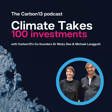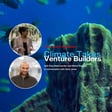Introduction to Climate Takes Podcast
00:00:11
Speaker
Hello and welcome Climate Takes, Carbon 13's podcast where we ask our special guests for their takes on their industry climate challenge and also ask what is it going to take to fight the climate emergency.
The Role of Corporate Venture Capitalists in Climate Startups
00:00:25
Speaker
Today is a very but special episode because we are looking at the world of corporate VCs. CVCs ah are significant investors in two startups. In fact, in 2024, it's estimated they invested at least $10 billion dollars into climate startups alone.
00:00:43
Speaker
And therefore, it's really important that founders and angels are understanding how CBCs work, what they're looking for, um and how this industry is changing as it has quite an interesting future over the next few years.
Guest Introduction: Mike Smead from Jaguar Land Rover's CVC
00:00:57
Speaker
I'm delighted to be joined by Mike Smead, who works for the CBC of Jaguar Land Rover In Motion Ventures, which specializes in pre-seed and climate. More on that later.
00:01:10
Speaker
Route to net zero is is a multi-billion trillion dollar problem. And actually it's the incumbents that have got the cash to to really be part of the solution.
00:01:20
Speaker
What I would say to to angels is that we know how difficult it is when when you're advising a startup company about how to engage corporates.
Engagement and Success with Startups
00:01:31
Speaker
talk to over two and a half thousand startups every year, like any VC would say.
00:01:42
Speaker
One of the things I'm most proud about is that 90% of our active portfolio today, which has 22 companies in it, are working with JLR in some way.
00:01:58
Speaker
Thank you so much for joining us. I'm very excited to hear what you've got to say about CVCs. Hi, Sarah. Thank you for having me. No worries. Okay, easy question.
Understanding Corporate Venture Capital (CVC)
00:02:09
Speaker
We'll start off with a million dollar question. So corporate venture capital is an investment vehicle set up by a corporate rather than ah series or rather than a a GP LP relationship that that VCs have.
00:02:23
Speaker
But specifically set up as an investment vehicle for a corporate for a specific reason. Now that reason could be to explore new technologies or new business models that could be opportunities or threats that the corporate sees on the far horizon beyond its existing planning cycles.
00:02:43
Speaker
and And how I would start that question, answering that question really would be that there's a lot of similarities between VCs and CVCs. Now typically a CVC would have one LP, whereas a ah g ah VC would tend to have a number.
00:02:59
Speaker
However, that's changing and we'll talk a little bit hopefully in a moment about how CVC is is definitely changing in the landscape. But typically they're set up for a specific reason. And that reason could be all the way from very strategic in terms of looking at those threats and opportunities that I've described, right the way through to, on the other end of the scale, um a very financially focused um CVC, which is looking to make money out of its investments as its sole focus.
00:03:30
Speaker
However, in reality, those two extremes are are incredibly rare. And in two and a half years of being in a CVC, I think I've met a couple at either end versus the hundreds that exist in the middle of that spectrum. And typically what we find is that um a CVC is set up to explore those strategic themes of the parent company, but also has as almost an entry into that, a financial focus to make sure that it's not losing money because there's not, you know, it's not very strategic to lose money left,
Why Corporations Choose CVCs Over R&D
00:04:05
Speaker
right and center. So you have to make sure that you are at least as an entry, you know,
00:04:11
Speaker
and making sure that those investments will at least wash their face, um even in the end when you're at a more strategically focused CVC. Okay, that makes a lot of sense. I think let's dive in a minute further into why a corporate would choose to do a CVC over R&D or over just being a customer in a minute.
00:04:31
Speaker
I think you alluded up to something there. Would you just give us your take on CVC in 2025 and how it's changed over the last few years?
Evolution of CVCs in Recent Years
00:04:40
Speaker
Yeah, so i I've been leading the managing director of InMotion Ventures now for for two and a half years.
00:04:46
Speaker
um And I've seen a lot of change just in that two and a half years alone. But when I was researching and and doing my homework before, before accepting this role within the company, um CVC has gone through huge amounts of change over the past five to 10 years, particularly in the US.
00:05:03
Speaker
And I think ourselves in Europe um are a little bit behind on that journey. um When I first started looking at CVCs, maybe the history of CVCs kind of five to 10 years ago um was very much um you know focused on on ah being an extension of business development.
InMotion Ventures: Independent Operations from JLR
00:05:22
Speaker
So traditionally, you know very close to the corporate, was very slow in its decision making, was you know kind of focused on safe bets.
00:05:33
Speaker
And really what we've seen over the past few years, and again, they they our US colleagues are much further advanced than this, really starting to take on some of those VC principles. um really focusing on making sure that the the corporate venture capital arm is acting um really quite independently from the parent. So there is that clear line between the two. So we are in motion ventures. We're not JLR ventures for for a reason. We're ah a wholly owned um subsidiary of JLR. So we have our own board. We have our own mandate from the parent and company to enable us to invest in our in our thesis as our sole LP.
Building Credibility in the VC Ecosystem
00:06:13
Speaker
um And really what we've been focusing on and a lot of my peers have been focusing on is building credibility within the VC ecosystem and whether that's amongst VCs, but also amongst startups as well, to make sure that people see us as that really you know as a really solid and credible player within the ecosystem so that we can bring what we believe are our unique values.
00:06:34
Speaker
um selling points as ah as an investor with the backing of our corporate parents to make sure that we can we can add value to the investments that we make. And I know that traditionally a lot of people listening to this, whether they're ah startups or angels, will raise their eyebrows when anyone talks about adding value to startups. But we we firmly believe that that that as ah as a as part of a corporate entity, we we have the opportunity to add value in a way that I believe is unique to our VC colleagues.
00:07:07
Speaker
um You mentioned the word unique. i heard I've heard you speak in the past about, I think one of the issues with approaching CVCs is they're all incredibly different to each other. i think there's even more difference than between a a set of VCs often in in what they're trying to achieve, how they work, who's working there.
Focus Areas of InMotion Ventures
00:07:25
Speaker
um the culture, et cetera. What is your thesis at In Motion Ventures then? yeah so i think you raise a ah great point and it goes back to why corporates set up CVC units in the first place.
00:07:41
Speaker
And there is a really broad spectrum. As I mentioned, we've got the kind of financial versus strategic, which I think is a little bit of an outdated concept now, given that it's ah it's a bit of both um and and the most there. So so really the...
00:07:56
Speaker
the why the CVC exists will be wholly dependent on the parent company and the way in which the parent company operates. So I talk to my peers in other CVCs, um you know whether it's in the US or Europe or in Asia, and some of the things that I would say to them would make them shiver in terms of of of the way of working in their corporate. And likewise, the way that they work, I just sit there and think that would never work in our environment.
00:08:23
Speaker
um However, I think what does really bring us together is ah real the real clear thesis on why we're investing. And what that allows us to do almost as a reverse pitch is to make it clear to startups or to fellow investors that What is it that InMotion Ventures or another CVC can bring to their cap table? What is it that, you know, that that is their unique selling point in terms of what they can do?
Investment Flexibility and Core Focus Areas
00:08:50
Speaker
We know that there are, you know, like we see in in VCs at the moment, VCs specialize, whether it's in different stages of a company's development, whether it's in the different kind of services that they add, whether it's portfolio or being a board member or or all of those things, because we're acutely aware that everyone's money is the same.
00:09:10
Speaker
So therefore, what we bring and how we persuade startups to take our money um is is a really important part of our thesis. So if like if if I go into our thesis specifically, so we we're an early stage investor.
00:09:24
Speaker
um So we look to invest at seed to series A as our sweet spot. However, we have invested at Preseed and with sufficient pull from the business, we've we've also had the flexibility to invest up to Series B
JLR's Strategic Transformation
00:09:37
Speaker
as well. But those are in the ah more unique or um ah special cases, shall we say.
00:09:43
Speaker
um And we focus on three core technologies. So climate, industrial and enterprise technologies. So you won't be surprised climate, which is the reason that we're having this conversation. But that really is to support technologies that will um enable and um and also speed up JLR's commitment to be net zero by 2039. So that's really focusing on the electrification of our vehicles all the way through from kind of pack production all the way through to Second Life and the recycling of of of those batteries.
00:10:19
Speaker
industrial decarbonisation of our plants and facilities and advanced materials. So looking there at low carbon or carbon negative materials, but also the circularity of those materials.
00:10:33
Speaker
And then I suppose what's less interesting maybe for your ah for your listeners will be industrial tech. So looking at advanced manufacturing and technologies for for companies that make things.
00:10:45
Speaker
And then enterprise, which is really focusing on um software for enterprises. So looking at things like um cybersecurity, um data, data management, cloud management and and things like that. And then underpinned by yeah um you know kind of what we call deep tech, which again is something that I think is really overused.
00:11:07
Speaker
um and And really misunderstood. But for us, it means really complicated things. They're going to take a while to to kind of come to to um fruition. And that's really focusing on things like sensors, semiconductors, space technologies, where we see an adjacency between space and space.
Call to Founders Aligned with JLR's Net Zero Commitment
00:11:24
Speaker
and um and and looking at the the OEM and and and the car world, um as as well as looking at things like AI and novel compute. So it's quite a broad thesis. And what that really um signifies is the fact that JLR's strategy is one that goes beyond the vehicle. This isn't just a product strategy that JLR has.
00:11:46
Speaker
and When we look at the the strategic transformation of the company, it goes beyond that. It goes into the type of company that JLR wishes to be, type of enterprise and that it wants to be, as well as the commitments that it's made from a sustainability perspective as well.
Favorite Investments: Cyclic Materials
00:12:02
Speaker
You wouldn't necessarily think, oh, JLR, okay, space, um but we're asking founders to come to you who've got vision and are on a mission. And so, um you know, they're really looking, you know, you've already set a timeline of 2039, actually. And so founders should be, okay, how does my company potentially at scale support that vision in that timeframe, right? That's 15 years from here, more or less.
00:12:28
Speaker
and ah What's one of your, i don't know, you're probably not allowed favourites, but what's ah a company you've invested in that youve you that comes to mind? It's like picking between one of my children, isn't it?
00:12:40
Speaker
So um'm i'm gonna I'll take a cop out. Let me talk about our most recent investments. So we recently invested in a company called Cyclic Materials, which is based in Canada. um And they are looking at the recycling of rare earth elements.
00:12:56
Speaker
and metals um that are used in the production of um electronic magnets. So they're used in wind turbines and they're used in um the essentially the the motors that power electronic vehicles.
00:13:10
Speaker
And currently less than 1% of those materials are recycled in Europe. um and and those materials are contained in a lot of electronic waste. So whether that is um you know computers, whether it's mobile phones, whether it all the way through to you know batteries that are used in electric cars. So there's quite a large amount of midst of raw material there.
00:13:34
Speaker
And actually we invested alongside companies such as Microsoft, Amazon, BMW and Hitachi, as well as ourselves in that in that investment more recently. and and And what's quite fascinating is, you know you talk about the way the world you know it kind of changes a lot. Obviously, you know this is being recorded at the end of end of February. And you know the the discussions between Donald Trump and Zelensky around rare earth minerals in Ukraine it's it is quite a large topic. And when we you know took this to our investment committee you know ah um ah before Christmas,
00:14:07
Speaker
um it's It's a really interesting one. We were having to talk about rare earth materials and what they meant and where they were used in vehicles. And there were lots of materials that end in IUMs that you never really heard of before. um So it was really interesting that, you know, we sometimes it'd be quite easy now to do that investment committee again because it's something that's really well publicized.
Creating a Climate Tech Ecosystem
00:14:30
Speaker
ah the The podcast episode a couple of that I recorded a couple before this is is literally climate takes critical materials and was looking at at the supply chains of rare earth minerals, for example, and the complexity of tracking those supply chains, let alone optimizing them, as as you will know.
00:14:48
Speaker
That's something that's important, if I could just, sorry, just on that one. Because what it what what it comes to is that when we look at climate tech, investing in particular, um we're starting to build a bit of an ecosystem around that, even within our Emotion Ventures portfolio.
00:15:05
Speaker
So as well as cyclic materials in the rare earth elements used in magnets, used for manufacturing, used in um the the recycling of of those materials.
00:15:17
Speaker
We've also made investments in battery recycling technologies, as well as a company called Circular based in the UK that's looking at battery passports and the and the tracking of materials um all the way through their lives. So from source all the way through to Second Life as
Rebranding Climate Tech Towards Broader Security Concerns
00:15:35
Speaker
So again, it's a really important thing, as you say, it's a very important you know, kind of topic, and which is getting quite a lot of focus at the moment, maybe not from, and again, you know, maybe we'll talk about this in a second, around the rebranding of Climatec from something that's,
00:15:52
Speaker
you know very much you know focused on the environment to one that's now focused on things like national security. you know even you know Even the way that Keir Starmer was talking um and they were talking about renewable energy in the UK, you know wind turbines, the the noise and and the the way in which we're looking at solar and wind turbine um energy generation in the UK, we're seeing that subtlety now of it moving away from um being necessarily all about the environment and net zero into, you know, how do we determine our energy security and how do we reduce our reliance on natural gas?
00:16:30
Speaker
The outcome is exactly the
Engagement Strategies for Startups and Angels with CVCs
00:16:32
Speaker
same. The way that it's talked about um and everything else, I think, you know, we're seeing a bit of a change in that at the moment. Yes, energy security, materials security, food security, um say a word, stick security on it, and it is both true.
00:16:48
Speaker
and often coincides with with climate. On i you know on the podcast previous to this, it's on on synthetic biology, um and that is viewed as a potential replacement for a lot of things which are either dependent on fossil fuels and or complicated supply chain.
00:17:07
Speaker
um in this podcast, we want to, we we want to talk about CBCs for angels and founders. And I think I'm going to start with, with angels first.
00:17:18
Speaker
What would you want startup angels to know about CBCs and your work?
00:17:27
Speaker
So when I talk to angel investors and we do through a lot of the work that we would do with, um, uh, being part of the the so we're we're based in London so we talked to a lot of groups in um in in London in particular and we'll go to events and we'll talk about CVC because there is a perception change that we have to overcome um amongst both angel investors and I think VC investors um in the UK and Europe um in particular as I mentioned I think our colleagues in the US are ah further ahead because I think they've got
00:18:00
Speaker
um a better track record than we have. And what I would say to so Angels is that we know how difficult it is when when you're advising a startup company about how to engage corporates.
00:18:11
Speaker
you know Quite often, the traditional routes of getting into a corporate are are many, but the shutters come down very quickly. and And what I would encourage people to think about is that CVCs are ah are a fantastic entry route into the corporate because you will get an incredibly quick no from a CVC, whether it's in or out of thesis, in a discussion with you know, with a member of our team that could probably take you six months to get to when you're being sent around the houses by various different groups, you know, within a corporate just because you can't find the right point of entry.
00:18:45
Speaker
So that, so, and and what I would also describe as well is that there's a lot of things that you might read about what corporates say, and I'll talk more generally now. I'm not talking about JLR, obviously, but when we look at kind of what a lot of corporates kind of talk about the areas that they're interested in,
00:19:03
Speaker
Actually, what we see is when you talk to a CVC, that's a sign of commitment when you do make an investment because all of a sudden you're putting your money where your mouth is rather than talking about the things that you're interested in, talking about what you're going to do you know in the in the future. so so So by really being clear on the CVC and also, as I mentioned, and we talked about just now, there are many different reasons for corporate having a CVC.
Understanding CVC's Investment Focus and Track Record
00:19:30
Speaker
So being able to talk to a member of the of the CVC investment team or the platform team is a really important way, you know, and yeah everyone's got their own websites, everyone's set up, you know, in differently. So I'd really encourage, you know, angels to be seeing um the CVC as a really viable way and ah and a relatively straightforward way into into the parent rather than you being set around the houses, but also really clear about what are the types of things we do invest in and we don't.
00:19:59
Speaker
And what is our track record of the companies in our portfolio? And what have we delivered? you know One of the things I'm most proud about is that 90% of our active portfolio today, which has 22 companies in it, are working with JLR in some way.
00:20:15
Speaker
Now, that could be through a proof of concept. It could be all the way through to a direct commercial relationship where they're a supplier or a customer to JLR. But that's something that we've worked on incredibly hard over the past two years to really focus on what we're doing with our portfolio companies because we're ah you know we're ready you know we're an early stage investor. This is a long term commitment that both ourselves and the startups and fellow investors are making. So therefore, we want to make sure that we're we have the ability to deliver on those promises and those discussions that we have um you know when we make an investment.
00:20:54
Speaker
So, you know, for any angel working with a startup, the very general advice is it can be a good way to really map out that organization or understand that, or you know, do market research.
00:21:06
Speaker
um But again, it's just this message. Every CVC is very unique and you and need to understand why it's come to be and its track record. ah community Completely, because what you will want and what an angel will want, whether it's either. so two things, you know, either thinking about future fundraising and the the way in which your cap table is being um is being kind of made up.
00:21:27
Speaker
But also from the other side is, you know, helping them in terms of business development, because typically, know, one of the large or areas that I see angels, you know adding the most value to to startup companies is being able to make those connections. And again, it's very difficult to to get into you know very large corporates such as JLR. And actually, that's the reason we exist.
Engaging with CVCs: Avoiding Uncertainty
00:21:50
Speaker
So we talk to over two and a half thousand startups every year, like any you know any VC would say. um But really, the the the value that we add and the reason that we exist is making the connections to the parent.
00:22:01
Speaker
Now, not all of those connections will end up with an investment. Some of those could end up in, yeah know, we have a venture clienting arm within JLR, for example. um So there are lots of ways in which we've actually introduced startups that we don't think quite meet our investment criteria.
00:22:18
Speaker
But we do see a need within the business. And therefore, you know, that could trigger into a relationship with JLR, not necessarily having, you know, having an investment. So I'd really encourage people to, you know, to to see the CVC as potentially a, you know, a quicker and slightly easier route to a no, because that's what a lot of founders tell us is, you know, please, you know, the worst thing, you know,
00:22:41
Speaker
for any startup is just having you know the perpetual you know kind of being blanked or ghosted by someone you know when when actually the the answer is no. you know Come back with more traction. We love
Venture Clienting vs. Venture Investing
00:22:53
Speaker
what you're doing. We just need to see this.
00:22:55
Speaker
and Completely. It just makes everyone's heart sink. But really, I think getting clear on on that. And that's what you know my team, you know Louis on on climate, um and together with Sam, who looks after our industrial enterprise,
00:23:08
Speaker
you know, kind of verticals. That's what they spend their time really doing and and making sure, you know, we're we're hopefully really clear on our website and we have, you know, a way of of of startups getting in contact with us, which we do actively look at um on a regular basis to make sure that we're filtering that through and we're getting back to people. But we're just making sure there that, that that um you know, that we can avoid that, you know, that just perpetual, you know, kind of loop of doom where, where you know, it's just silence that comes back.
00:23:38
Speaker
um You briefly mentioned venture clienting. I'll just say it's that's where a corporate is looking to be a customer of a startup, but in a weird way, similar to almost if they were being an investor. So it's a really, really early stage startup.
00:23:55
Speaker
So they are sort of working with them from very early stage to try and develop their product to a place where they could be a normal customer, as I understand it. Yes, so it takes many forms. But yeah, so how I would describe the difference between venture clienting and and venture investing is venture clienting is typically based on a problem statement from the company.
Open Innovation Approaches at JLR
00:24:17
Speaker
so we have So within JLR, there are a large number of people working in that area that are focused on um ah using startups because we know that you know true innovation is happening within startups. It's not happening necessarily in large corporates.
00:24:34
Speaker
And therefore, be having access to the startup ecosystem is really important to generate innovation within within a company. now Again, as I kind of described, you know having ah a startup working with a big corporate tends to be very difficult.
00:24:51
Speaker
And therefore, venture clienting is a great way based on a problem statement approach. So a member of the team will say, you know i um I've looked at my incumbent supply base. I've looked at our ability internally, and I would really like to do X. But at the moment, I don't see a technology being able to um ah to be able to address that.
00:25:11
Speaker
So the the venture clienting process will then run that through a scouting process using InMotion Ventures you know um ah platform data as well as our corporate partner Plug and Play.
00:25:25
Speaker
and And that will enable us to scout very quickly amongst the thousands of startups you know globally um to focus in on who do we think the startups are that are providing you know that technology and and it's so and it's very a a very managed process whereby those are then filtered down into a pitch.
00:25:46
Speaker
Those pitch can then move into a pre into a proof of concept and then those proof of concepts could then then be moved into a a commercial relationship kind of after after that point so it's a very managed process that makes sure that um these things survive through through the process and that the you know the corporate machine if you will doesn't kind of you know have an allergic reaction to a startup company kind of coming in in a world in which you know typically large corporations like to work with large suppliers because you know there's a mutual understanding there of of of kind of how things work.
00:26:25
Speaker
And that's a very successful way of of JLR being able to work with those startups and bring those technologies. Now, the difference there is that that's typically based on an identified problem.
00:26:38
Speaker
The way that we work within venture capital, very so CVC is very similar to venture capital, but we're focused on themes rather than specific problem statements.
00:26:49
Speaker
And also our value comes in ah bringing um technologies into the business that maybe they haven't thought about yet. A great example of that was an investment we made in a semiconductor um open source design company called Chipflow.
00:27:05
Speaker
um Now, when we first met them about six to nine months ago, this was an area that JLR wasn't thinking about for two or three years away. But actually, on the back of our investment and the introductions that we were able to make,
00:27:19
Speaker
actually we they managed to fast forward a lot of their thinking and in actual fact you know a proof of concept was born a um in ah in a module that they designed which was delivered in months versus years um and much significantly cheaper than the millions it normally takes to so design a semiconductor chip.
00:27:42
Speaker
And therefore, that you know the next step for us is now to move that into into
Building Relationships with CVCs
00:27:46
Speaker
kind of production. so So that's how I would describe the main difference between a venture clienting approach and then venture investing. But it's all part of a suite of approaches to what we call within the company open innovation.
00:28:00
Speaker
and You know I would say out of about 76 carbon investments,
00:28:09
Speaker
And our founders are literally waking up every morning. How can I work with a corporate? Because that's what I need. You mentioned you're talking to 2,500 startups or or however many every year.
00:28:21
Speaker
What does a good relationship building strategy look like with a CVC? um What are you hoping to see from founders? When should they start to get in touch with you?
00:28:33
Speaker
What kind of style of communication um How often? What updates? What's good relationship building actually look like? I think that's a great question. And I think, you know, we are seed to Series A investor, typically, as i as I kind of mentioned. So we are looking for those early stage technologies that are going to take a while to develop.
00:28:58
Speaker
So again, I know and everyone uses the the term patient capital, but that's a really important point for us. And actually, we've realized that and in in quite a way that's maybe a bit different how people would think, we actually find
Addressing Tangible Problems in Startups
00:29:13
Speaker
it easier to bring in ah much earlier stage startup company into um into the parent than we do a later stage company.
00:29:21
Speaker
And typically that's because that later stage company might be you know bumping into established relationships between the parent and a large ah large supplier.
00:29:32
Speaker
Now, so so so that's an area that now what that brings with it is obviously us developing relationships with startups in that really early stage.
00:29:45
Speaker
Now, sometimes we are going to hit people with the, you know, it's a bit too early for us and we need to you know kind of see how ah how it kind of develops. But the really big thing that we're looking for, and we if I look at the investments that we've made um in these spaces, it's one, is is the solution that the startup is designing or developing or wants to develop addressing a real core problem?
00:30:10
Speaker
Now we're seeing a lot of, you know, everything's AI nowadays, everything's quantum, everything's all of these things, and they're really neat solutions, but has the problem being properly defined yet?
00:30:22
Speaker
And that's a really big thing for for us, particularly as an OEM, in a heavy heavily regulated industry, we need to be sure, particularly in the climate space, that it is addressing tangibly the route to carbon net zero by 2039.
00:30:39
Speaker
So sometimes when we look at, and I'll give you an example. So if you look at um ah biofuels is ah is is a great example of of that. I can see there's a really great tangible link for biofuels as we've seen within aviation.
00:30:54
Speaker
or shipping or logistics because you've got that point to point, you know exactly what is going into your plane or your ship. So therefore, for companies that are looking at sustainable aviation fuel or biofuels, that's brilliant to be talking to an airline CVC or ah you know a shipping CVC or a logistics one.
00:31:15
Speaker
For us, it's incredibly difficult because for a driver of one of our vehicles, we don't know which station they're going to. So for scope three emissions for us, it's quite difficult for us to put a percentage on on the vehicle on the on that element of the vehicle because we simply don't know tangibly where that that customer or the client who's driving our vehicles, where they're going to be filling up at a station because it will just get absorbed between all the other forms of fuel.
00:31:43
Speaker
So we've actually you know passed on a number of...
The Role of CVCs in the VC Ecosystem
00:31:49
Speaker
synthetic fuels biofuels um things like that just for that simple reason and i think that's a really tangible way of being able to talk to to startups in those spaces just to say you know look we we're really we we talked in our pre-call about greenwashing and and that is a big fear of large corporates because and and that's something that you know we want to make sure we can tangibly link our investments back to JLR's route two to to net zero by 2039.
00:32:17
Speaker
However, that is a problem that JLR is not going to solve on its own. It's a multi-billion dollar, trillion dollar problem that you know we're going to have to work together. you know and And we do actively invest alongside some of JLR's competitors, you know whether it's BMW or Volvo, Hyundai, Porsche,
00:32:35
Speaker
You know, these these are really good friends of ours and people that we talk to on a regular basis in their investment arms to make sure that we're working towards very similar goals. I think that's really interesting because you would probably think, oh, car company, they'll love a biofuel.
00:32:51
Speaker
um But such as the complexity of climate, as you're saying, you can't guarantee that the driver is going to be filling it with the biofuel and not the petrol. ah when the engine is interchangeable between the two. Correct.
00:33:03
Speaker
And it's a very simple thing with hydrogen. And again, you know if if we think about hydrogen at the moment and the use cases within hydrogen, very much they are point to point use cases. So trucking, you know where you've got a depot, because we've all seen the issues where they you know with rolling out and an electric charging infrastructure.
00:33:22
Speaker
If you then think about doubling that up with a hydrogen one as well, you know again, I think that's one that, you know Like many OEMs, JLR has placed its bets firmly you know in the in the battery space.
00:33:35
Speaker
And therefore, that's one, you know again, hydrogen but you know would not be an area that we'd be looking to invest in as part of our you know our existing thesis for you know for a very similar reason.
00:33:47
Speaker
that's that's That's looking at the CBC's track record again, right? So if you're a big battery investor, you're probably not going to go big on hydrogen for transport. ah Not that hydrogen for transport is doing that well right now, but this is just an example.
00:34:03
Speaker
ah But just really quickly, so you know you want founders who are really and understanding the problem to be getting in touch with you and saying, look, this is what we're doing. This is why the problem is so important to JLR.
00:34:16
Speaker
And yes, I'm working on the solution. So perhaps for anybody listening to this, if you're thinking about writing that email, ask yourself, have I spoken about the problem and demonstrated that I am an expert in the problem area? I think at the end of the day, CBC investing is still like VC investing in that they're investing in the team and the founders um as as much as anything, especially at at Seed, um and need to believe that you're the right people to carry this forward.
00:34:44
Speaker
and Absolutely. I would say that and and And where we're moving away from is this view that CVC is necessarily something different to venture capital.
00:34:56
Speaker
I think it's an extension of venture capital. and And that's what I would I don't want it to. sir i root The perception that we're looking to change is that something's an either or an or. Actually, it's a it's a really valuable element of the VC ecosystem, and we are supported by a parent company with access to tools technologies and expertise that some of our vc partners do not have and actually you know we work very closely with a lot of our you know lead investors so we we co we co-invest we don't we don't look to to lead rounds so working with a lead investor um to say okay what can you what can you bring to this you know how can you work with these guys to understand how things are developing
00:35:40
Speaker
in the countries in which you
Maintaining Confidentiality and Trust
00:35:42
Speaker
operate? How are you seeing things develop? And typically at that seed and and and pre-seed stage, we're either the first OEM investor on the cap table or the first enterprise investor on that cap table. So so we're helping in some of the go to market approaches for startups, because this typically would be their first, ah particularly at that seed stage, going to talk to a procurement um you know person in a large corporate is a bit of a daunting process.
00:36:13
Speaker
Now, what we've been able to help our portfolio companies with is set them up with the friendlier, if they if they exist in procurement, the friendly person within within the procurement team who can help them you really understand what's in the head of a corporate procurement person. What are they looking for?
00:36:31
Speaker
How is this conversation going to land? How can we help you shape your you know your business model or or something like that? Now, What I would really emphasize in that is we have a very clear and thick wall between InMotion Ventures and JLR, the parent company.
00:36:47
Speaker
And we take... the confidentiality of our relationships, both with the startup and with our corporate parent incredibly seriously, because we know that if we ever were to cross that wall, nobody would ever trust us again from either side.
Corporate Involvement in Net Zero Transition
00:37:02
Speaker
um So therefore, it's really important to us that relationships that we build with our startups as an investor in them and how we promote them are very, very different to the commercial relationships that exist with JLR because clearly, you know, vice versa, there's information that is is confidential that we wouldn't be sharing with either party.
00:37:25
Speaker
Why why do you think it's important for large corporates like JLR to be part of the net zero transition? I think we're talking in a climate where we've perhaps seen some corporates slightly roll back on their commitments.
00:37:40
Speaker
um and Maybe that's just the temporary political wind. Who knows? um what What would be your take? So I think if I go back a number of years and I was you know particularly interested in the climate space, and actually that's one of the reasons I joined JLR in the first place you know sick six years ago, was I wanted to be part of something that was industry defining or industry changing.
00:38:07
Speaker
yeah I had the great fortune of working at a retailer when you know when internet shopping was not a thing. And you know all of a sudden, someone would be walking in saying, oh, you know we sold a thousand pounds of of cosmetics you know through our online channel you know and we got very excited about that whereas now it's kind of you know 40 50 60 percent of of that company's you know revenue channels so so and and that's really what i saw within within automotive that there is a commitment which let's be honest has driven a lot by regulation into a particularly in europe about what can and and and can't be sold in the future but i think the sea change that we're seeing is that the incumbent legacy companies
00:38:47
Speaker
are no longer seen as the bad person.
Technological and Psychological Challenges of Net Zero
00:38:49
Speaker
you know It used to be, you know when I was there, you know when we were talking about this at the very beginning, legacy companies were seen as the enemy. you know Look what they've done. you know This is horrendous.
00:38:59
Speaker
And therefore, we need something completely different. Whereas now, what I think people have realized is that the the route to net zero is is a multi-billion trillion dollar problem. And actually it's the incumbents that have got the cash to so really be part of the solution to to changing that.
00:39:17
Speaker
And also, you know as as we move um you know through that through that process, it's really important that we remember that our route to net zero is 50% technological and 50% psychological.
Cross-Industry Partnerships for Sustainability
00:39:31
Speaker
And that was a great piece that came through from, had a great privilege of listening to a panel that Rory Sutherland was on at Climate Week a couple a couple of years ago. And it really hit home that that that that is the case because at the moment, and we see it at the moment within the EV infrastructure or the way the EV sales, they're growing.
00:39:54
Speaker
but they're still heavily dependent on subsidies because consumers at the moment are not willing to sacrifice the performance or inefficient or a perceived level of um of, let's say, difficulty in in owning or using something or price.
00:40:14
Speaker
So customers are still not willing to give up what we call it performance and price. but ah Customers are still ah or clients and and consumers and people are still are still not willing to put up with an inferior product or a perceived inferior product or a more expensive product in the pursuit of net zero gains. They're just simply not there yet. So we've got to do a lot of of work to persuade to people that, you know, actually, you know, typically, if I look at, you know, in the world of batteries or even going into tire recycling, for example, typically the recycled product is of a higher quality than the virgin product.
00:40:54
Speaker
And that's something that people you know don't necessarily realize and understand. But again, how we help people understand you know as we go through that process um you know is is going to be one that I think is going to take a really broad church to do. And again, some of the investments that we've made in technologies have been alongside fashion companies.
00:41:14
Speaker
you know If you look at Jen Phoenix, for example, a leather recycling company based in Peterborough in the UK. you know We invested alongside Tapestry, who have Coach as one of their brands, and Dr.
Mike Smead's Passion for Climate Impact
00:41:27
Speaker
weaver We were the three strategic investors in GenPhoenix's round. And it's again really important to think about how are people considering you know that um the their buying behaviours, their habits, in terms of that route to to net zero.
00:41:44
Speaker
Okay, there's lot of food for thought there. i'm
00:41:50
Speaker
ah We've got time for ah one last question, which is, um you've said this is the best job that you've ever had. Why? It's it's a great, so, yeah, well, I have to caveat with that saying that up until two and a half years ago, I spent 25 years in the finance function, so I suppose anything would be considered a yeah um a positive thing after that. But,
00:42:15
Speaker
So to be honest, the bit I really love is the variety, the variety that we have and the conversations that we're able to have. And I think that the and the impact that we're making already within you know our parent company since we reset the thesis. So we're about we're a group of people who are trying to make a real tangible impact on you know the startups that we work with and invest in and our parent company.
00:42:40
Speaker
And we're doing that. And I get a huge amount of satisfaction um from that because i see the difference that we're making on a daily weekly monthly basis i see when you know just the um just the other day um you know that proof of concept was approved with one of our um portfolio companies with with jlr and that was just fantastic news to you know see how that's you know developing how that relationship is developing and and you think and again this is something where we've gone beyond where the company was thinking
00:43:11
Speaker
And six to nine months after our investment, we were able to bring that company into a proof of concept that's now working with the parent. Now, startups and angels who are listening to this might just think, oh, my God, that's such a long time.
00:43:23
Speaker
But actually, that's pretty quick. Yeah, think it is. Yeah. In terms of what we're able to do.
Career Reflections and Encouragement
00:43:29
Speaker
So one step at a time. We're making our decisions quicker. We're acting in ah in a more VC way. And we've got to keep working on the parent to to keep speeding that up.
00:43:39
Speaker
um Because I think it'ss it's easy to underestimate what you're doing, Mike, even just the decision to stop being ah a finance director and go into CVC.
00:43:53
Speaker
In large part, you said because of climate. You know, we really, when we talk about like psychology, one of the most important things that somebody can do is when they have that seniority and when they have those years of experience and they have those relationships with um especially at these large corporates, and they're able to say, OK, for my next career move, I'm going to see where I can make most difference the most difference to climate innovation.
00:44:17
Speaker
um I think it's easy to ah to underestimate that and say, yes, of course, that's a very obvious thing to do. But it's actually not. And I think it's very brave um to stick your head above the parapet for anybody with an established career to then say, right I'm going to actually do something quite new.
00:44:35
Speaker
ah which may or may not succeed, because I believe it might help um the climate. ah And at the end of the day, the climate emergency is not going away. and So I actually think that is quite and it's important to represent that journey, Mike, to show other people that this could be one of the this could be one of the most impactful things that they do with their whole career.
00:44:57
Speaker
Well, that's a lovely thing for you to say, sir, and thank you. but But also I feel as though I'm in very warm, safe company. So if I think about, um you know, what you tend to see more recently is that a lot of the CVC heads, so doing my role, tend to come from the parent company.
00:45:15
Speaker
Whilst our investment team, um our principals, our associates come from a VC background, actually the ah people leading the CVCs tend to be now more inside people because they are able to make those connections back into the parent company and as a former member of JLR's finance leadership team i I believe I have a level of credibility um yeah across the business because one of the most amazing things about finance career like a cvc is it can be completely you know different you can move from one role to another and it's completely different and you touch a large part of the organization in a very credible way and and that's what i believe you know if i look back and you know what i believe i've i've helped the team do over the last two and a half years i think it's it's making those connections in a really credible way but at the same time you've got to have
00:46:08
Speaker
you know I can you know knock those doors, but those doors have still got to be unlocked and opened. And I think I am very you know lucky in the sense that I work with it a very you know enlightened group of people in JLR who are you know working incredibly hard and um are making big changes every day um you know to to to deliver on that commitment that we've made.
Conclusion and Call to Action
00:46:31
Speaker
Thank you. Well, we're about at time, Mike. So I think when we look back on this episode of Climate Takes, um I think it's going to take technology and psychology, consumer behaviour.
00:46:44
Speaker
It's going to take people choosing where to apply their experience. It's going to take understanding ah the varied world of CVCs and understanding how to engage, when to engage and and when to step away. um And I think climate is going to take corporate VCs.
00:47:04
Speaker
Thank you very much for joining me, Mike. Thank you. I've really enjoyed it. Thanks, Sarah. You're very welcome. And then just for everybody listening, you're very welcome to subscribe for upcoming episodes of Climate Takes.
00:47:15
Speaker
And actually, at the moment, applications for our programs are open, our Venture Builder and our Accelerator. So if you are a founder who's working in climate, and particularly if you think that maybe one day you want to have an investable venture, ah which could work with the likes of JLR, well, Carbon 13 is a great place to start that journey. Thank you very much.











